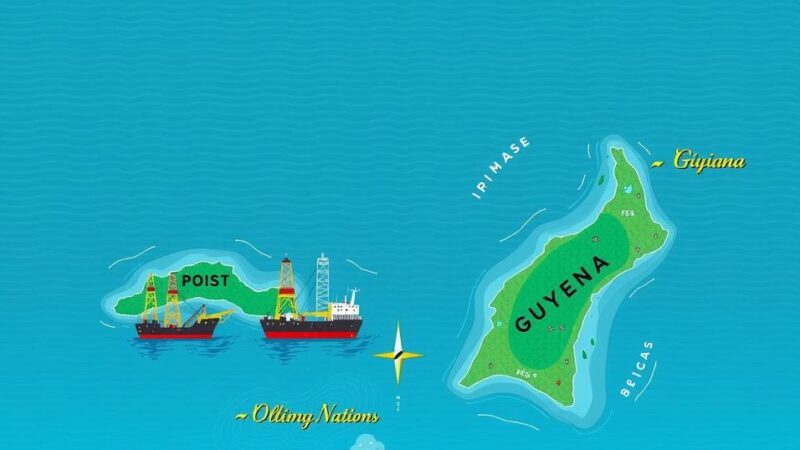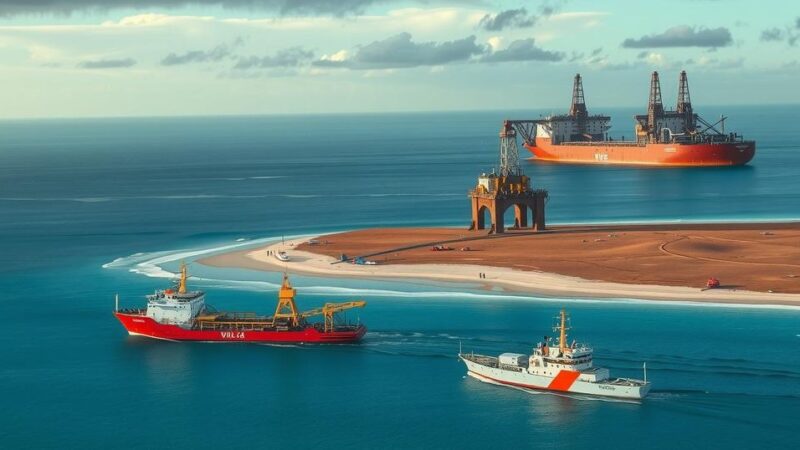Bougainville seeks independence through a challenging political process after a 97.7% vote in favor of secession from Papua New Guinea. President Ishmael Toroama faces obstacles, including parliamentary delays over ratification. Bougainville’s unique cultural identity, along with economic and institutional shortcomings, complicate its sovereignty quest while providing opportunities for potential growth through resource management and international partnerships.
Bougainville stands on the precipice of potential independence, often being described as the world’s next youngest nation following South Sudan. Despite a decisive referendum five years ago in which Bougainvilleans voted overwhelmingly for secession from Papua New Guinea (PNG), actual progress has largely stalled, hampered by numerous political and logistical challenges that complicate the quest for self-determination in this autonomous archipelago of approximately 300,000 residents.
Ishmael Toroama, the President of Bougainville and a former rebel leader, has made independence his central political agenda. However, he encounters significant obstacles, including the inertia within the PNG Parliament that is obstructing the recognition of the referendum results. Furthermore, establishing a fully sovereign state is arduous; Bougainville must build institutional frameworks and develop fiscal structures necessary for effective self-governance.
Historically, Bougainville has maintained strong separatist inclinations based on its distinct cultural identity and a history of political and economic marginalization rooted in resource exploitation. The region declared independence in 1975, just before PNG gained its independence from Australia, but this effort was unsuccessful and Bougainville became incorporated into PNG.
Following persistent tensions and a brutal civil war starting in 1988, exacerbated by the mismanagement of the Panguna copper mine, a peace agreement was brokered in 2001. This led to the establishment of the Autonomous Bougainville Government (ABG) and included a non-binding referendum on independence, ultimately held in 2019, where nearly 98 percent of voters expressed a desire for secession from PNG.
Although the referendum’s outcome was a powerful expression of Bougainvilleans’ aspirations, its legality requires ratification by the PNG Parliament. Unfortunately, the parliamentary process has been slow and fraught with contention. The ABG argues that a simple majority should suffice for ratification, whereas PNG insists on a two-thirds majority, complicating any progress toward independence.
As deadlines set by the Era Kone covenant approach, there remains a lack of clarity surrounding parliamentary action on the referendum result. There are important political calculations at play; some lawmakers fear the implications of supporting Bougainville’s independence could inspire separatist sentiments in other PNG provinces and impact the economic interests tied to Bougainville’s resources.
The 2019 referendum distinctly highlights Bougainville’s aspirations for independence; however, PNG asserts that the ultimate decision rests with its Parliament. Despite this, the ABG has proposed a draft constitution that could facilitate a unilateral declaration of independence, reflecting Bougainville’s determination to realize its ambitions for sovereignty, even if international recognition remains uncertain.
Efforts to foster dialogue have seen the appointment of Sir Jerry Mateparae as mediator between the two governments in hopes of breaking the deadlock surrounding Bougainville’s political future. Nonetheless, critical limitations prevail, including the economic and institutional deficiencies that Bougainville currently faces, which complicate its path toward statehood. The region relies heavily on central subsidies and lacks the infrastructure necessary to support a functional independent state.
Prime Minister James Marape of PNG has stressed the need for a responsible approach during the post-referendum process; however, he has also indicated that Bougainville must develop self-sufficiency to survive as an independent entity. As it stands, Bougainville’s health and education sectors are severely underserved, and common services remain inadequately funded, posing significant challenges to development.
The ABG has initiated measures to enhance institutional capacity through agreements aimed at transferring powers from the PNG government. By signing the Sharp Agreement, Bougainville is gaining more autonomy to manage internal matters, encouraging local governance. Additionally, resource exploration, particularly mining, is being re-evaluated, with plans to reopen the Panguna mine, a source of significant past conflict but also potential future revenue.
In light of these developments, the ABG is diversifying its international engagements, actively courting support from the United States while also exploring partnerships with Chinese enterprises for infrastructural advancement. The strategic interests of both superpowers in the Pacific are likely to complicate Bougainville’s aspirations, as regional geopolitical dynamics continue to evolve.
As Bougainville approaches upcoming elections, uncertainty lingers over its leadership direction. While President Toroama expresses intentions to run again, potential shifts in governance could alter the region’s trajectory concerning its independence aspirations. Ultimately, Bougainville’s journey toward nationhood faces numerous intertwined challenges; yet the palpable conviction among its populace, rooted in the clarity of their referendum, continues to foster resilience as they navigate their path forward as a potential sovereign entity.
In summary, Bougainville’s pursuit of independence is fraught with substantial political, economic, and practical challenges. Despite an overwhelming vote favoring secession from Papua New Guinea, the path to realized sovereignty remains unclear due to legislative inertia and disputes over the ratification process. Critical institutional developments and necessary fiscal independence must be addressed for Bougainville to successfully transition into a sovereign nation. The aspirations of Bougainvilleans, however, remain strong, reflecting a commitment to achieving independence amidst ongoing regional complexities.
Original Source: thediplomat.com






